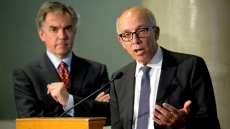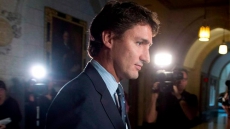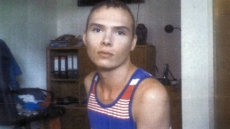OTTAWA - It would be foolish to say the Canadian Security Intelligence Service has "all the bases covered" when it comes to monitoring radicalized Canadians who have returned home, a senior CSIS official acknowledges.
Jeff Yaworski, CSIS deputy director of operations, told the Senate national security and defence committee Monday that the spy service must prioritize efforts to keep its eye on dozens of returnees.
CSIS says between 130 to 145 Canadians are overseas taking part in guerrilla-style battles waged by the Islamic State of Iraq and the Levant and other groups, as well as supporting extremists through fund-raising and propaganda.
Canada and other western nations fear that radicalized young people who travel abroad could come home with intent to do harm.
"It is something that concerns us greatly and it is our No. 1 priority," Yaworski told the senators.
The RCMP recently said it has about 63 active investigations on 90 suspected extremists who intend to join fights abroad or who have returned to Canada.
Yaworski says while CSIS knows where the returnees are, the spy service must undertake monitoring in line with its budget.
"We have to prioritize these investigations. We have to dedicate our limited resources to those that we think are the greatest threat," he said.
"What does keep me up at nights is those who haven't come across our radar screen."
Informants are the intelligence service's "bread and butter" in determining which individuals "are more radical than others," Yaworski said.
The service also uses court-approved warrants to monitor people of concern.
Liberal Sen. Colin Kenny expressed reservations about CSIS's ability to keep tabs on possible extremists in Canada, given its current personnel levels and the labour-intensive nature of monitoring a suspect.
Yaworski said the service's success rate had been "quite good," but added: "I'd be foolhardy to say we have all the bases covered. We do what we can with the budget that we have."
The federal Conservatives are poised to introduce legislation to make it easier for CSIS to track suspected Canadian extremists abroad and add another layer to the protections that shield the identities of the service's human sources.
CSIS has not been asked to take part in Canada's combat role in Syria intended to diminish the capability of ISIL's forces, Yaworski said.
"If we are, we certainly will be there," he told the senators.
"What we're focused on now are areas outside of the immediate conflict zone, and we're covering what we can through the deployment of human sources into the area."
However, Yaworski indicated it was hard to zero in on Canadian extremists in the region. "It's a very difficult area, and the ability to get clear visibility on Canadian targets who might be there — or any other targets from an ISIL perspective — is a very difficult one."
One of the challenges the RCMP faces at home is the burden of proving an alleged jihadi's intention to commit a violent act or join an extremist group, Yaworski said.
"These individuals, when they're about to leave the country, will not advertise where they're going. They will travel to other parts of the world. So they obfuscate their routes. They borrow or steal passports of other individuals to facilitate their travel. They engage in activities to hide their trails and to make it difficult to prevent their departure."
When they return, it's one thing for CSIS to tell the RCMP a Canadian has fought overseas with a terrorist group, he said.
"It's something else for them to be able to prove that in a court of law."





